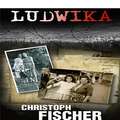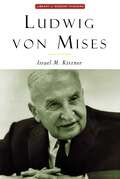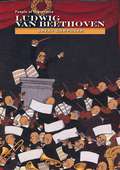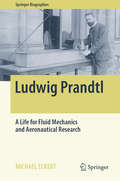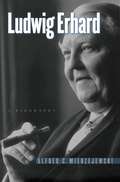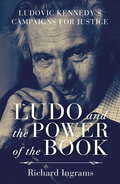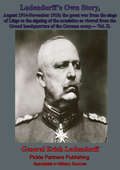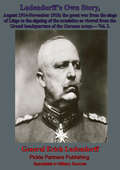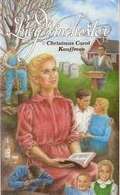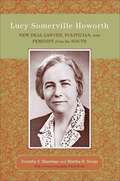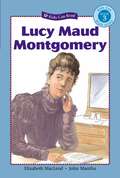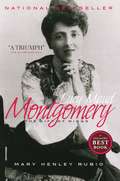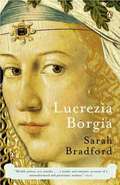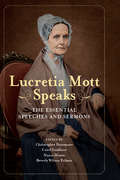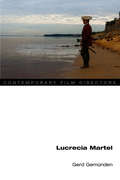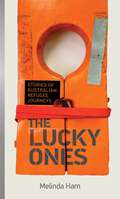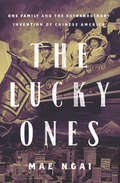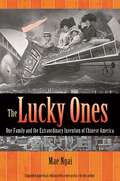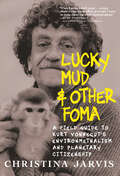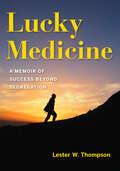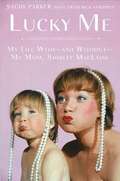- Table View
- List View
Ludwika: "Am Ende wird immer alles gut."
by Christoph FischerEs ist der Zweite Weltkrieg und Ludwika Gierz, eine junge Polin, die ihre Familie verlassen muss um in Nazideutschland für einen SS-Offizier zu arbeiten. Dort muss sie eine Gratwanderung durchmachen und erlernen, als Bürgerin zweiter Klasse in einer Welt zu leben, in der auch nur ein falsches Wort eine Katastrophe bedeuten und jeder Tag ihr letzter sein könnte. Basierend auf einer wahren Begebenheit ist dies eine Geschichte von Hoffnung, inmitten von Verzweiflung und Liebe inmitten von Verlust. . . Letztendlich ist es die Überlebensgeschichte einer Frau. Redaktionelle Rezension: "Dies ist die beste Art von Fiktion, da sie auf dem wirklichen Leben basiert. Ludwikas Geschichte zeigt das Ausmaß des menschlichen Leidens, das durch den Zweiten Weltkrieg verursacht wurde und mehrere Generationen und viele Nationen noch heute betrifft. Der Zweite Weltkrieg ließ niemanden unberührt, und Ludwikas Leben verdeutlicht diese tragische Tatsache. Sie erinnert uns aber auch daran, wie hell der menschliche Geist leuchten kann, wenn die Dunkelheit so unerbittlich fällt wie in Kriegszeiten. Dieses Buch ist eine Achterbahnfahrt voller Aktionen und Emotionen, die von Herrn Fischer gekonnt erzählt werden. Er brachte etwas Frisches und Neues zu einem Thema, über das bereits tausende von Geschichten erzählt wurden.
Ludwika
by Christoph Fischer Cibelle RavagliaDurante a Segunda Guerra Mundial, Ludwika Gierz, uma jovem polonesa, é forçada a deixar sua família e ir para a Alemanha nazista, onde trabalhará para um oficial da SS. Lá, Ludwika tem que aprender a conviver todos os dias com os perigos e riscos do regime nazista, sendo considerada inferior em um mundo onde uma palavra errada pode colocar sua própria vida em risco e onde todos os dias podem ser os últimos. Baseada em fatos reais, esta é um história de esperança em um mundo deseperador, uma história de amor em meio a perdas incalculáveis... enfim, é a história de uma polonesa que luta para sobreviver.
Ludwig Von Mises: The Man & His Economics (The\collected Works Of Israel M. Kirzner Ser.)
by Israel KirznerIsrael Kirzner, a former student of Ludwig von Mises, looks at the influences of the economic debates in Europe on von Mises' thought, traces his theories as they developed in his writings, and discusses both critical and supportive commentators on von Mises.
Ludwig van Beethoven: Great Composer
by Anna Carew-MillerA German composer born in the 1700s, Ludwig van Beethoven has given the world some of the most well-known and long-lasting music of all time. From his Für Elise to his 9th Symphony (in which a choir sings words from the poem "Ode to Joy"), Beethoven's music is still loved, almost 200 years after his death. Amazingly, Beethoven composed music while being unable to hear almost anything from the time he was 26, a feat which makes his brilliant compositions all the more wonderful. Few musicians have had the incredible impact on music that Beethoven had. Learn the story of one of the most important musical composers of all time in Ludwig van Beethoven: Great Composer.
Ludwig Van Beethoven (Getting To Know The World's Greatest Composers)
by Mike VeneziaPresents a biography of Ludwig Van Beethhoven
Ludwig Prandtl: Ein Unverstellter Blick Auf Sein Leben
by Michael EckertThis is a comprehensive biography of Ludwig Prandtl (1875-1953), the father of modern aerodynamics. His name is associated most famously with the boundary layer concept, but also with several other topics in 20th century fluid mechanics, particularly turbulence (Prandtl's mixing length). Among his disciples are pioneers of modern fluid mechanics such as Heinrich Blasius, Theodore von Kármán and Walter Tollmien. Furthermore, Prandtl founded the Aerodynamische Versuchsanstalt (AVA) and the Kaiser-Wilhelm-Institut für Strömungsforschung in Göttingen, both of them seeds for the growth of fluid mechanics in Germany. <P><P> Yet Prandtl was also a representative of aeronautical research - from Imperial Germany via the Weimar Republic to the "Third Reich". Although not a party member, he assumed the role of a goodwill ambassador for Nazi Germany. This objective treatment of his career will be of interest to all scientists and historians wanting to learn more about Prandtl's influence and the early development of fluid- and aerodynamics.
Ludwig Erhard
by Alfred C. MierzejewskiIn the first English-language biography of one of the most important figures in postwar German history, Alfred C. Mierzejewski examines the life and service of Ludwig Erhard (1897-1977), West Germany's first minister of economics and second chancellor. Erhard liberalized the German economy in 1948 and is generally considered the father of West Germany's "economic miracle--the period of extraordinary growth in jobs and improvement in the standard of living in the 1950s that helped stabilize Germany's first successful democracy. While recent scholarship has dismissed Erhard's influence on Germany's economic recovery, Mierzejewski returns to little-cited German analyses and Erhard's own record and concludes that Allied currency reform and Erhard's liberalization of the economy were crucial triggers for Germany's unprecedented economic boom. Mierzejewski provides insight into Erhard's policies, his ideas, his character, and his relationships with Konrad Adenauer and Charles de Gaulle. By offering a fresh account of Erhard's career as a leader in postwar West Germany, Mierzejewski provides a deeper understanding of Germany's economy as well as its democracy.
Ludo and the Power of the Book: Ludovic Kennedy's Campaigns for Justice
by Richard Ingrams'Stirring' Roger Lewis, Daily Mail, BOOK OF THE WEEK'A warm and worthy tribute' The Times'Elegantly written, thought-provoking' The Lady'A lucid and affectionate portrait of one of the great journalists of his day' ObserverSir Ludovic Kennedy was a British journalist, television personality, humanist and author. Following a brief naval career, Ludo devoted his life to what he referred to as his 'lifelong obsession with miscarriages of justice' and he fought this cause tirelessly, until he died in 2009. He is best known for re-examining cases such as the kidnapping of American toddler Charles Lindbergh, about which he wrote his most ambitious book on injustice, The Airman and the Carpenter. Ludo's writings and work on other cases such as the murder convictions of Timothy Evans and Derek Bentley were unique in that they often dispelled the breeding ground for conspiracy theories and regularly heralded dramatic changes of public opinion. Ludo is considered to be hugely influential in the abolition of the death penalty in the UK as well as other legal reforms, most notably the Police and Criminal Evidence Act (1984) which obligated police to tape-record the questioning of suspects. His life story is one that deserves to be remembered and celebrated.Richard Ingrams first met Ludovic Kennedy in 1963 and the pair quickly bonded over their shared goal of exposing the fallible nature of the British justice system. Ingrams interweaves this biography with detailed analysis of the cases to which Ludo dedicated his life, vividly recapturing the spirit of his friend and colleague.
Ludendorff's Own Story, August 1914-November 1918 The Great War - Vol. II: from the siege of Liège to the signing of the armistice as viewed from the Grand headquarters of the German army (Ludendorff's Own Story #2)
by Anon Anon General Erich Friedrich Wilhelm LudendorffAs the German army moved swiftly into its start positions at the beginning of the First World War, efficiently and seamlessly forming up for the hammer blow that was to fall on France it must have been with some pride that General Ludendorff would look upon the first grand strategical plan that he had a hand in. A cool, calculating planner dedicated to ensuring that chance played as little a part in war as possible General Erich Ludendorff was the product of the prestigious German Kriegsakademie. His memoirs on the First World War are an excellently detailed account of the planning and execution of the ambitious German High command and their thirst for VictoryAlthough known primarily as staff officer his initial service, in the German army, during the war, was at the siege of Liège for which he was awarded the coveted Pour La Mérite by the Kaiser himself. He was rushed to the embattled Eastern Front as Chief of Staff to General von Hindenburg, and the two made an impressive team winning that battles of Tanneburg and the Masurian Lakes. Once again Ludendorff, this time was his chief Hindenburg, was drafted in as a replacement to ensure the fortunes of the German forces, this time on the Western front in 1916. He operated as the prime mover in the German empire from this point until the end of the war; masterminding the 1918 offensives as the last throw of the dice before capitulation.This second volume covers from 1917 until the end of the War and is enriched with maps of the campaigns of the First World War.Author -- General Ludendorff, Erich Friedrich Wilhelm, 1865-1937.Translator -- Anon.Text taken, whole and complete, from the edition published in New York and London, Harper & Brothers, 1919.Original Page Count - 473 pages
Ludendorff's Own Story, August 1914-November 1918 The Great War - Vol. I: from the siege of Liège to the signing of the armistice as viewed from the Grand headquarters of the German army (Ludendorff's Own Story #1)
by Anon Anon General Erich Friedrich Wilhelm LudendorffAs the German army moved swiftly into its start positions at the beginning of the First World War, efficiently and seamlessly forming up for the hammer blow that was to fall on France it must have been with some pride that General Ludendorff would look upon the first grand strategical plan that he had a hand in. A cool, calculating planner dedicated to ensuring that chance played as little a part in war as possible General Erich Ludendorff was the product of the prestigious German Kriegsakademie. His memoirs on the First World War are an excellently detailed account of the planning and execution of the ambitious German High command and their thirst for VictoryAlthough known primarily as staff officer his initial service, in the German army, during the war, was at the siege of Liège for which he was awarded the coveted Pour La Mérite by the Kaiser himself. He was rushed to the embattled Eastern Front as Chief of Staff to General von Hindenburg, and the two made an impressive team winning that battles of Tanneburg and the Masurian Lakes. Once again Ludendorff, this time was his chief Hindenburg, was drafted in as a replacement to ensure the fortunes of the German forces, this time on the Western front in 1916. He operated as the prime mover in the German empire from this point until the end of the war; masterminding the 1918 offensives as the last throw of the dice before capitulation.This first volume covers his early career until 1917 and is enriched with maps of the campaigns of the First World War.Author -- General Erich Friedrich Wilhelm Ludendorff, 1865-1937.Translator -- Anon.Text taken, whole and complete, from the edition published in New York and London, Harper & Brothers, 1919.Original Page Count - 477 pages
Lucy Somerville Howorth: New Deal Lawyer, Politician, and Feminist from the South (Southern Biography Series)
by Anne Firor Scott Dorothy S. Shawhan Martha H. SwainBorn, raised, and retired in Mississippi, Lucy Somerville Howorth (1895--1997) was a champion for the rights of women long before feminism emerged as a widely recognized movement. As told by Dorothy S. Shawhan and Martha H. Swain, hers is a remarkable life story-from a small-town upbringing to a career as an attorney, an activist, and the last of a generation of New Deal women in Washington, D.C. She held a presidential appointment under every chief executive from Franklin Roosevelt to John Kennedy.Howorth was a fervent believer in the power of organizations to bring about change, and she became known for her leadership qualities, acumen, and quick appraisal of social problems, particularly as they affected women. Shawhan and Swain point out that her winsome personality, small stature, and delightful sense of humor also aided her as a female aspiring in a man's world. In 1931 she was elected to the Mississippi House of Representatives and, after campaigning for Roosevelt, was rewarded by the new president with a federal appointment. She served in a number of subsequent roles, rising to become general counsel of the War Claims Commission, at that time the highest legal position in an executive commission ever filled by a woman.Howorth worked relentlessly for the advancement of women, especially through the American Association for University Women and the National Federation of Business and Professional Women. She lobbied for equality in the workplace, helping to effect significant advances in government and the professions. In 1944, at the request of Eleanor Roosevelt, Howorth delivered the keynote speech at the White House Conference on Women in Postwar Policy-Making, the most memorable of her many public addresses.This first-ever biography of Howorth bestows long-overdue recognition of her many notable achievements and illuminates the activism of women in the decades often considered to be the doldrums of the women's movement.
Lucy Maud Montgomery
by Elizabeth MacleodMeet Lucy Maud Montgomery -- world-famous author. The story of her dedication to her craft and the creation of Anne of Green Gables, her best-loved novel, is told in level-appropriate language.
Lucy Maud Montgomery: The Gift of Wings
by Mary Henley RubioMary Henley Rubio has spent over two decades researching Montgomery's life, and has put together a comprehensive and penetrating picture of this Canadian literary icon, all set in rich social context. Extensive interviews with people who knew Montgomery - her son, maids, friends, relatives, all now deceased - are only part of the material gathered in a journey to understand Montgomery that took Rubio to Poland and the highlands of Scotland. From Montgomery's apparently idyllic childhood in Prince Edward Island to her passion-filled adolescence and young adulthood, to her legal fights as world-famous author, to her shattering experiences with motherhood and as wife to a deeply troubled man, this fascinating, intimate narrative of her life will engage and delight.From the Hardcover edition.
Lucrezia Borgia: Life, Love, and Death in Renaissance Italy
by Sarah BradfordTake a road trip with the undead . . . in this latest in the argeneau series by New York Times bestselling author Lynsay Sands For Basha Argeneau, anything is better than facing her estranged family. Even hiding out in sweltering southern California. But when a sexy immortal in black shows up determined to bring her back to the clan, she'll do anything to keep far, far away from the past she can't outrun. Marcus Notte isn't here to play games—especially not with someone as crazy as the infamous blonde. Asked by Lucian Argeneau to bring her back for questioning, Marcus is determined to carry out Lucian's request—no matter how the seductive little mind-reading vamp feels about it. Basha doesn't mind fighting fire with fire, especially with a hot immortal involved. But if he wants to take her away, he'll have to catch her first . . .
Lucretia Mott Speaks: The Essential Speeches and Sermons (Women, Gender, and Sexuality in American History)
by Carol Faulkner Christopher Densmore Lucretia Mott Nancy A HewittCommitted abolitionist, controversial Quaker minister, tireless pacifist, fiery crusader for women's rights--Lucretia Mott was one of the great reformers in America history. Drawing on widely scattered archives, newspaper accounts, and other sources, Lucretia Mott Speaks unearths the essential speeches and remarks from Mott's remarkable career. The editors have chosen selections representing important themes and events in her public life. Extensive annotations provide vibrant context and show Mott's engagement with allies and opponents. The result is an authoritative resource, one that enriches our understanding of Mott's views, rhetorical strategies, and still-powerful influence.
Lucrecia Martel (Contemporary Film Directors)
by Gerd GemündenFilms like Zama and The Headless Woman have made Lucrecia Martel a fixture on festival marquees and critic's best lists. Though often allied with mainstream figures and genre frameworks, Martel works within art cinema, and since her 2001 debut The Swamp she has become one of international film's most acclaimed auteurs.Gerd Gemünden offers a career-spanning analysis of a filmmaker dedicated to revealing the ephemeral, fortuitous, and endless variety of human experience. Martel's focus on sound, touch, taste, and smell challenge film's usual emphasis on what a viewer sees. By merging of these and other experimental techniques with heightened realism, she invites audiences into film narratives at once unresolved, truncated, and elliptical. Gemünden aligns Martel's filmmaking methods with the work of other international directors who criticize—and pointedly circumvent—the high-velocity speeds of today's cinematic storytelling. He also explores how Martel's radical political critique forces viewers to rethink entitlement, race, class, and exploitation of indigenous peoples within Argentinian society and beyond.
A lucky person has only to be born
by Robert K. BurnsThe potato famine forced his ancestors to leave the “Ould Sod” and to plant roots in Askeaton, Wisconsin. Eighty years later and in the year of Ireland’s Independence, the author, Robert K. Burns, was born in Kaukauna, Wisconsin, on November 10, 1922. He was the second-born of the eventual six-child family of his railroading father and loving mother, born Florence Campbell of Hilbert, Wisconsin. The world welcomed this delightfully “Irish” free-spirit during an era of peace and close family relationships and at a time when the phrase “For God and Country” was a way of life and family entertainment was the primary source of social pleasure. Bob’s wit, insight, and innate wisdom, helped him accept and enjoy God’s simplest or most complex creations and creatures. His love, compassion, and understanding made him a joy to his family, his friends, and later in his profession as a dentist to his patients. As a result of the Great Depression the railroad failed. Bob’s father took the family back to a small farm in Askeaton, Wisconsin, the locale of many of the events he recalls in his book from 1933 even to this day, for his new Irish cottage is located within a mile of the old farmhouse. Troubles for most Americans during the thirties were numerous and varied. Bob’s eternal optimism, however, enabled him to help himself and his family soar over them. He was finding silver linings, roses, and rainbows long before it became fashionable for many to even look for them. He was and still is a happy Catholic whose faith, hope and love are constantly tested and challenged. “Being born” to him was synonymous with good luck and God’s blessings. Perceiving humor in mettle-testing obstacles that God cast into his pathway he reacted with witty mainspring resilience and mature good-natured responses. Even in the hemophiliac conditions of his three sons he was able to find enough humor to give strength to his wife, Ginny, his family and himself. God’s designs were his construction blueprints for a life that had to be lived to be enjoyed. Although he is aware of the imperfections of man and that man-made plans often go awry, he never forgets that God created smiles for good purpose. His forte is his ability to induce smiling in others. My greatest pleasure in encouraging Bob to publish his prose and poetry will be the first smile he evokes from you, the reader. Then I will know that I have not misjudged the purpose behind the humble wit and wisdom of my life-long companion and wholly unselfish buddy. May you and the author react favorably to one another. May Heaven’s door be open to both of ye and may God save ye kindly. —Daniel J. Burns, Jr.
The Lucky Ones
by Jenny BrownJonathan Safran Foer meets Jeffrey Moussaieff Mason in a poignant, provocative memoir of survival, compassion, and awakening to the reality of our food system. Jenny Brown was ten years old when she lost a leg to bone cancer. Throughout the ordeal, her constant companion was a cat named Boogie. Years later, she would make the connection between her feline friend and the farm animals she ate, acknowledging that most of America's domesticated animals live on industrialized farms, and are viewed as mere production units. Raised in a conservative Southern Baptist family in Kentucky, Brown had been taught to avoid asking questions. But she found her passion and the courage to speak out. The Lucky Ones introduces readers to Woodstock Farm Animal Sanctuary which Brown established with her husband in 2004. With a cast of unforgettable survivors, including a fugitive slaughterhouse cow named Kayli; Albie, the three-legged goat; and Quincy, an Easter duckling found abandoned in New York City, The Lucky Ones reveals shocking statistics about the prevalence of animal abuse throughout America's agribusinesses. Blending wry humor with unflinching honesty, Brown brings a compelling new voice to the healthy-living movement--and to the vulnerable, voiceless creatures among us.
Lucky Ones: Stories of Australian refugee journeys
by Melinda HamThe Lucky Ones is a moving and meticulously researched book of refugee stories from award-winning journalist and former foreign correspondent Melinda Ham.Though they are from different generations, countries and cultures, the families in this book all have one thing in common: they have escaped persecution in their homelands to find safety in Australia. Spanning 70 years, and tracking journeys from Iraq, Afghanistan, Poland, Tibet, Vietnam and Zaire, The Lucky Ones offers a window into the complex history of Australian refugee experiences.More than 35 million refugees around the world are currently waiting to be resettled. In their own words, the people in this book are some of the 'lucky ones' who survived terror, detention, beatings and torture to reach a country that offered them a new beginning.
The Lucky Ones: One Family and the Extraordinary Invention of Chinese America
by Mae NgaiIf you're Irish American or African American or Eastern European Jewish American, there's a rich literature to give you a sense of your family's arrival-in-America story. Until now, that hasn't been the case for Chinese Americans. From noted historian Mae Ngai, The Lucky Ones uncovers the three-generational saga of the Tape family. It's a sweeping story centered on patriarch Jeu Dip's (Joseph Tape's) self-invention as an immigration broker in post-gold rush, racially explosive San Francisco, and the extraordinary rise it enables. Ngai's portrayal of the Tapes as the first of a brand-new social type--middle-class Chinese Americans, with touring cars, hunting dogs, and society weddings to broadcast it--will astonish. Again and again, Tape family history illuminates American history. Seven-year-old Mamie Tape attempts to integrate California schools, resulting in the landmark 1885 Tape v. Hurley. The family's intimate involvement in the 1904 St. Louis World's Fair reveals how the Chinese American culture brokers essentially invented Chinatown--and so Chinese culture--for American audiences. Finally, Mae Ngai reveals aspects--timely, haunting, and hopeful--of the lasting legacy of the immigrant experience for all Americans.
The Lucky Ones: One Family and the Extraordinary Invention of Chinese America - Expanded paperback Edition
by Mae M. NgaiThe Lucky Ones uncovers the story of the Tape family in post-gold rush, racially explosive San Francisco. Mae Ngai paints a fascinating picture of how the role of immigration broker allowed patriarch Jeu Dip (Joseph Tape) to both protest and profit from discrimination, and of the Tapes as the first of a new social type--middle-class Chinese Americans. Tape family history illuminates American history. Seven-year-old Mamie attempts to integrate California schools, resulting in the landmark 1885 case Tape v. Hurley. The family's intimate involvement in the 1904 St. Louis World's Fair reveals how Chinese American brokers essentially invented Chinatown, and so Chinese culture, for American audiences. Finally, The Lucky Ones reveals aspects--timely, haunting, and hopeful--of the lasting legacy of the immigrant experience for all Americans. This expanded edition features a new preface and a selection of historical documents from the Chinese exclusion era that forms the backdrop to the Tape family's story.
Lucky Mud & Other Foma: A Field Guide to Kurt Vonnegut's Environmentalism and Planetary Citizenship
by Christina JarvisA fascinating deep dive into Kurt Vonnegut&’s oeuvre and legacy, illuminating his unique perspective on environmental stewardship and our shared connections as humans, Earthlings, and stardust.Vonnegut&’s major apocalyptic trio—Cat&’s Cradle, Slapstick, and Galápagos—prompt broad global, national, and species-level thinking about environmental issues through dramatic and fantastic scenarios. This book, Lucky Mud and Other Foma, tells the story of the origins and legacy of what Kurt Vonnegut understood as &“planetary citizenship&” and explores key roots, influences, literary techniques, and artistic expressions of his interest in environmental activism through his writing. Vonnegut saw writing itself as an act of good citizenship, as a way of &“poisoning&” the minds of young people &“with humanity . . . to encourage them to make a better world.&” Often that literary activism meant addressing real social and environmental problems—polluted water, soil, and air; racial and economic injustice; isolating and dehumanizing technologies; and lives and landscapes desolated by war. Vonnegut&’s remedies took many forms, from the redemptive power of the arts to artificial extended families to vital communities and engaged democracies. Reminding us of our shared connections as humans, as Earthlings, as stardust, Lucky Mud helps fans, scholars, and book lovers of all kinds experience how Vonnegut&’s writings purposely challenge readers to think, create, and love.
Lucky Medicine: A Memoir of Success beyond Segregation
by Lester W. ThompsonA remarkable, personal glimpse of Black student life at Indiana University in the early 1960s. In 1961, a skinny African American boy from Indianapolis arrived at Indiana University Bloomington determined to become a doctor. For the next three years, Lester Thompson kept a detailed, intimate diary of his journey to graduation. In Lucky Medicine, Lester returns to his long-ago journal and, with honesty, humor, and a healthy dose of rueful self-reflection, shares stories from his college years at Indiana University. Fascinating glimpses emerge of Black Greek life at the time, including the building of the Kappa Alpha Psi fraternity house and the successes, struggles, and social lives of its members. Lester's student years were driven by hard work, but also bustled with fun and drama. He recalls his time studying at the university library, falling in and out of love many times, becoming friends with fellow fraternity brother Booker T. Jones, a truly memorable invitation extended to meet with George Wallace, and an epic, no-holds-barred brawl with limestone cutters at the 24-Hour Grill. Lucky Medicine offers a closeup, unforgettable look at IU student life just before the sweeping social changes of the 1960s, when students of color accounted for less than 2 percent of the Indiana University's student body.
Lucky Me
by Sachi ParkerSachi Parker opens up about her unconventional childhood and shares stories from her past as the only child of famed actress Shirley MacLaine. Shirley MacLaine has graced Hollywood with her talent for decades. Yet, as Sachi Parker can attest, being the daughter of a movie star was far from picture-perfect. In Lucky Me, the only child of the Academy Award-winning actress opens up about her unique experiences of growing up with a mother who believed in reincarnation and extraterrestrials--but not necessarily parenthood. Lucky Me is not only Sachi's personal story but also a compelling snapshot of America in the second half of the twentieth century, from the Rat Pack world of the '60s through the free-love '70s to the new-age self-absorption of the present. It offers a compelling insight into the politics of Hollywood, where the fight for the spotlight never ends and your fiercest rivals are closer than you think. There are Sachi's warm and admiring remembrances of legendary actors--Jack Nicholson, Jack Lemmon, Robert Mitchum, her uncle Warren Beatty--as well as acid-sharp portraits of the schemers and buffoons who roam the hills of La-La Land. Ultimately Lucky Me is a bittersweet love letter to a mother who is at once a universally beloved and larger-than-life figure and yet always seems beyond reach.
